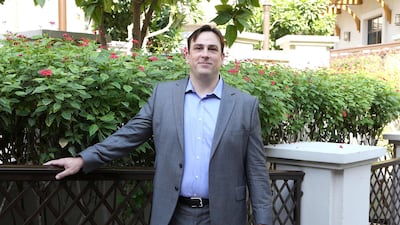The naming director Christian Turner often has to correct people about what his job creating brand names actually involves.
“People imagine I sit browsing through a thesaurus all day. But that’s the last place I go, because the first 100 ideas I might have are already gone,” explains the executive from the global strategy, design and brand experience company Siegel+Gale.
“Those words are now messages that everyone’s heard before and therefore are no longer persuasive. We like Instagram and Ice Cream Sandwich, we like things with flavour and the meals that we’ve been having all our lives lack that flavour. Words that are meant to mean a lot – like happiness, sometimes now mean the least.”
Some of the names Mr Turner has dreamed up in his role, which covers the Emea region, include Shatterproof, a non-profit organisation focused on ending addiction, and Pontoon, the merger of two Adecco companies. And when Emaar’s budget hotel brand Dubai Inn wanted to stand out in a crowded market, Siegel+Gale’s team of nine namers came up with Rove Hotels.
But as Mr Turner pointed out at Siegel+Gale’s Simplicity Talk in Dubai last month, agencies choosing names for companies based in the UAE must also appeal to Arabic speakers.
“It’s much harder to do a Snapchat or Zipcar in Arabic,” he says. “In English it’s easy because we’ve got very used to digesting newly invented compound words. In Arabic, it doesn’t feel natural to Arabic speakers.”
Local Arabic brand names that have so far made the transition to the global marketplace tend to be what Mr Turner calls “clear message names” – such as Etihad, meaning “unity” and Al Tazaj, meaning “fresh”. Dominant brands in the GCC also tend to be establishment companies that adopt the provenance-and-industry convention: Emirates airline and Qatar Airways, Saudi Telecom Company (STC) and Saudi Electricity, and Qatar National Bank (QNB).
Simple describing names are often used for locations in Dubai. Mr Turner notes how Siegel+Gale’s offices are in Media City, right next to Internet City: “This was an easy naming solution but it wasn’t necessarily the most efficient.”
James Pass, however, a Dubai-based creative principal and owner of James Pass Design, disagrees. “As Dubai expands and develops more free zones tailored to varying industries, this type of naming carries transparency of offering, empowers building of communities and offers ease of translation across English and Arabic. It also opens up for easy naming expansion in the future.”
The brand names companies choose can also have an effect on how we speak. Mr Turner cites the example of a consumer buying a new phone with Gorilla Glass and Snapdragon processors and then using WhatsApp to order Uber. "We have a limited number of characters and sounds and we're having to put words together in mad dashes," he adds. "Who exactly gets to decide that 3D printing is called 3D printing? I think it's a terrible name for that category. There's a bit of magic to it – it's like Star Trek – and 3D printing is much bigger than the reference point. But we evolve reference points.
“We go from roads to railroads, from ships to steamships, from mail to email, and then because we’ve created email, we have to retrofit snail mail to come up with another term.”
Mr Pass thinks the key characteristics of millennials and Generation Z will play an increasing role in naming decisions. “Their transparency, cause and caring for society may take us back to basics where more humble and authentic naming may take place,” he adds.
Mr Turner, on the other hand, anticipates brand names getting weirder. “A smart entrepreneur moves in a new direction, avoids familiar reference points and picks a name that communicates ‘different’ and ‘cool’ using an implicit tone, rather than an explicit message.
The branding expert says JadoPado, an online marketplace focusing on technology and founded in 2010, five years after Souq, proves this point, using a name with no clear message at all.
The JadoPado founder Omar Kassim says he deliberately picked a name that wouldn’t box his company in. “We used to be an electronics e-commerce retailer and have evolved into a marketplace – I expect we’ll continue to evolve in the technology space as we grow,” he adds. “We also wanted a name where you could easily fulfil the ‘Just X It’ criteria – like ‘Just Do It’, ‘Just Google It’. Hopefully ‘Just JadoPado It’ will become common lingo one day.
“The name had to be geographically free, and one for which a dot-com domain was available but without too many Google search results, so that any searches for us would show us.”
In the end, the inspiration for JadoPado came from an unexpected source.
“The word originates from a dialect of Gujarati spoken in northern Indian. My sister came up with it after seeing my son Adam who was around 10 months old at the time, crawling about. In its essence it’s to call someone a bit of a fatty in a very endearing manner.”
business@thenational.ae
Follow The National's Business section on Twitter

